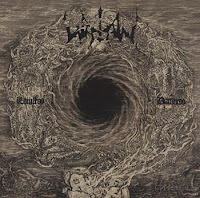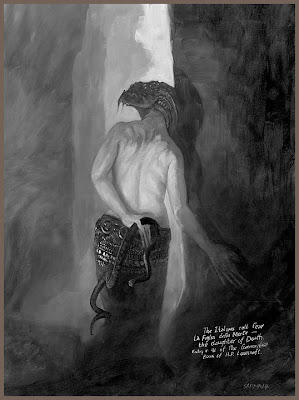>
All posts by Indy
>SRM Reviews (#72 June 2010) Watain – Lawless Darkness
>Published in Sweden Rock Magazine #72 June 2010.
Here’s the unabridged version.
Watain
Lawless Darkness – 9/10
Season of Mist (Sound Pollution)
Det här är ett storslaget verk sprunget ur mörkermagiskt vansinne. Mäktigt och komplext, men ändå med ett helvetes driv. En episk tripp som går på djupet, men ändå bara skummar på ytan. Jag tror nämligen att Watain har ännu mer att ge, hur märkligt det än må låta.
Men jag var skeptisk. Hur kan man tio år efter den fullkomligt fanatiska debuten Rabid Death’s Curse utveckla och förnya en hel genre – till det bättre? Vad kan man göra efter Casus Luciferi och Sworn to the Dark utan att totalt tappa fotfästet eller upprepa sig? Jag trodde inte att Watain hade så mycket mer att ge, men efter tjugo intensiva genomlyssningar är jag överbevisad och sitter här med kalsongerna på huvudet. Den entitet som är Watain tar nu black metal vidare på allvar.
Samtidigt är detta en återgång, flera steg tillbaka bortom det tidiga raseriet. En hyllning till de klassiska album som släpptes på åttiotalet där varje låt var något av det bästa som gjorts; mästerverken som för alltid kommer att finnas i våra själar. Känslan framträder tydligast i Kiss of Death, ett lapptäcke av tvära kast som bara växer och växer. Överlag dryper plattan av allsångsvänliga slagdängor (Quorthons ande är allestädes närvarande) som till en början må framstå som primitiva, men som är ruskigt effektiva. Du lär komma ihåg de här låtarna. Och här finns skivans styrka: det enkla vävs samman med det komplexa, och balansen däremellan är perfekt, vilket även kan sägas om produktionen. Tore Stjerna har överträffat sig själv i den anrika Necromorbus-studion. Skivan kunde inte ha låtit annorlunda.
Enkelheten återkommer även i texterna. Det är slagkraftig lyrik, men ganska långt ifrån de komplexa sjoken på de två första skivorna. Även här en återgång alltså, som egentligen började redan på Sworn to the Dark. Jag gissar på en vilja till makt, att hitta urkraftkällorna. Ibland slår det enkla hårdare än det svåra.
Att kalla detta ett mästerverk är dock omöjligt. Det återstår att se om tio år. Men ändå: Waters of Ain. Carl McCoy. Herrejävlar.
Fields of the Nephilim-sångaren medverkar blott med tjugosju ord i detta avslutande stycke, men stämningen – som redan är magisk – höjs ytterligare några snäpp när karln börjar mässa. Just Waters of Ain (jag antar att ordleken ”Wat” och ”Ain” är medveten) blir smältdegeln där allt som byggts upp under resans gång faller på plats. Epik i kubik, men enbart på ett självklart och upphöjande vis, aldrig patetiskt.
Varje spår är värt sin vikt i guld, men d-taktsröjet i Malfeitor och Total Funeral måste framhävas, liksom den mäktiga refrängen i Wolves Curse. Här finns så mycket att ta av att en viss yrsel infinner sig när reptilhjärnan försöker bearbeta materialet, och ändå är det så snyggt sammanhållet – och alltid omisskännligt Watain. Paketeringen, där den hittills relativt okände Zbigniew M. Bielak står för all konst, sluter cirkeln. Total perfektion.
Även om tio år lär jag bocka och buga inför Lawless Darkness. Kanske har jag även då kommit överens med albumtiteln…
>Emot världen, emot livet
>
Michel Houellebecq
H.P. Lovecraft – Emot världen, emot livet
>The Letting of Blood – Blood Meridian Pt. 2
>
The nihilism in McCarthy’s Blood Meridian is ever present, and it’s not that shallow, quick nihilism you might be used to. This shit is deep. The above quote could be seen as a description of what became of the original owners of the American land. Total death. Read more about that here.
As the gang rides – like the four horsemen of the apocalypse, but more of them – the world opens up showing its most grim and vile side. And in this world, the gang only live to kill, or rather: to kill before they are killed. McCarthy once said in an interview that he’s not particularly interested in books that don’t deal with issues of life and death. One commentary said: ”But his books are only about death, never about life”. I’d say it’s quite the opposite. Or rather: life is death. As simple as that. And McCarthy is the master of storytelling it in a beautiful and haunting way.
His visions are morbid, yet so full of beauty. They tell us things of utmost importance, things about life and how we are. He encompasses the brutal and more base elements of human nature, skipping the newspaper politics altogether, and still manages to convey a message: There won’t ever be a John Wayne type of character coming to the rescue. This is not the romantic West. This is the real deal, this is the brutal truth.
And the truth reads like the Old Testament, both in its biblical rhetoric and its doom-like message about the void, Satan (Judge Holden) and the slaughtering of innocence. This is pretty far from good versus evil – this is evil versus even more evil. And that’s what the Old Testament and this world is all about, right? Right.
People speak of The Great American Novel. Well, thinking of how America is portayed in Blood Meridian, it sure is stunning and beautiful in its descriptions of the lawless West, but as for the people and the nihilism and misanthropy ruling the souls of the gang… Here is no peace. And in that sense, this is more like The Great Anti-American Novel.
To be continued in part three…
>The Evening Redness in the West – Blood Meridian Pt.1
>
The Old West was scary as hell and Blood Meridian (1985) will break your spirit. Violence is just the beginning, and as Cormac McCarthy begins to paint these pictures with his words of death – a tree strewn with dead infants hung by their jaws – some people will probably stop reading. Too bad, because this is one of the best reads ever.
The story is based on My Confession, the questionably authentic autobiography of Civil War Commander Samuel Chamberlain, which recounts his youth with the notorious Glanton Gang – a group of American mercenaries hired by the Mexican government to slaughter Native Americans.
And so it begins…
See the child. He is pale and thin, he wears a thin and ragged linen shirt. He stokes the scullery fire. Outside lie dark turned fields with rags of snow and darker woods beyond that harbor yet a last few wolves. His folk are known for hewers of wood and drawers of water but in truth his father has been a schoolmaster. He lies in drink, he quotes from poets whose names are now lost. The boy crouches by the fire and watches him.
Night of your birth. Thirty-three. The Leonids they were called. God how the stars did fall. I looked for blackness, holes in the heavens. The Dipper stove.
The mother dead these fourteen years did incubate in her own bosom the creature who would carry her off. The father never speaks her name, the child does not know it. He has a sister in this world that he will not see again. He watches, pale and unwashed. He can neither read nor write and in him broods already a taste for mindless violence. All history present in that visage, the child the father of the man.
After finishing The Road back in 2006 (read my reflections here), I felt the need to read every word from this man’s pen. Now, having read Blood Meridian twice, I must say it surpasses The Road on many levels, even though they are totally different. The main difference being the prose.
The language in The Road is very sparse, almost stripped of everything, based on repetition, but still very powerful, perfectly reflecting the setting of the postapocalyptic world. It’s a fairly easy read. Blood Meridian is dense as fuck, also based on repetition – the repeated violence – and is a much tougher read. There were some words in here that I couldn’t even find in the dictionaries. Still, I enjoyed the prose immensely. Everything is this world is so ugly and brutal, but McCarthy describes this darkness in jaw-dropping fashion, so very beautiful. And in between all the emotionally disturbing violence is McCarthy’s fantastic prose depicting the beauty of the desert landscape these killers travel in. The whole novel reads like one long descripive narrative, almost dreamlike.
They entered the city in a gauntlet of flung offal, driven like cattle through the cobbled streets with shouts going up behind for the soldiery who smiled as became them and nodded among the flowers and proffered cups, herding the tattered fortune-seekers through the plaza where the water splashed in a fountain and idlers reclined on carven seats of white porphyry and past the governor’s palace and past the cathedral where vultures squatted along the dusty entablatures and among the niches in the carved facade hard by the figures of Christ and the apostles, the birds holding out their own dark vestments in postures of strange benevolence while about them flapped on the wind the dried scalps of slaughtered indians strung on cords, the long dull hair swinging like the filaments of certain seaforms and the dry hides clapping against the stones.
In this world where both life and objects are without value, where children, old ladies and dogs are slaughtered by Judge Holden and his gang, where Holden speaks in long rants about Indian vases and amazing discoveries, only to destroy them when finished – these passages of desert mystic calm are much welcomed. Because this is the end of mankind and this book answers the ultimate question: What is the meaning of life? To survive and to destroy those who don’t want you to survive.
The judge smiled.
The characters in Blood Meridian represent true evil. The leader of the pack, Judge Holden, is a Kurtz-like philosopher who believes in war like others believe in God. His monologues are truth revealed.
The man who believes that the secrets of this world are forever hidden lives in mystery and fear. Superstition will drag him down. The rain will erode the deeds of his life. But that man who sets himself the task of singling out the thread of order from the tapestry will by the decision alone have taken charge of the world and it is only by such taking charge that he will effect a way to dictate the terms of his own fate. […]
It makes no difference what men think of war, said the judge. War endures. As well ask men what they think of stone. War was always here. Before man was, war waited for him. The ultimate trade awaiting its ultimate practitioner. That is the way it was and will be….
War is the ultimate game because war is at last a forcing of the unity of existence. War is god.
At one time in the book, one person chooses life over death. The kid gets a rare opportunity to kill the judge. The judge stands naked and unarmed in the desert before the kid, taunting the kid to take a shot. The kid is cheered by one of his companions: “You’ll get no second chance lad. Do it. He is naked. He is unarmed. God’s blood, do you think you’ll best him any other way? . . . Do it or I swear your life is forfeit.”
This is when morality comes into play. The amoral core of Judge Holden’s inhuman soul versus the human morality of the kid.
To be continued in part two…
I predict 2010 to be the year of the cowboys, the indians and the ceaseless violence.
Red Dead Redemption!
>R.I.P. – Ronnie James Dio 1942-2010
>
We’re the last in line
Ronnie James Dio – the master voice and wonder of evil heavy metal – passed away on Sunday, May 16th, 2010.
I don’t usually care that much when famous people pass away. Everybody dies. Ronnie was suffering from stomach cancer at the age of 67. It was just a question of time.
However, he was still the best heavy metal singer out there. His vocals were even better on stage than in the studio. To me, Dio is a true legend and his work has meant a lot to me. I believe the video for We Rock was the first song I ever heard from Dio (this very version), and that was back in 1984/85 on Swedish Television. I caught that on tape and it’s by far the most watched video ever in my home. Thus, The Last In Line is my favourite album, and being the doom fan that I am, I believe that Egypt (The Chains Are On) was one of the first doom songs I ever encountered. The lyrics suit my mental state more now than ever, the atmosphere is pure magic and Dio’s voice is – as always – superior.
Check out this amazing version where they incorporate Black Sabbath’s Children of the Sea – another great doom masterpiece.
And the magic was strong and true
Then the strange ones came and the people knew
In the land of no tomorrow
Where you pray just to end each day
And your life just slowly melts away
Maybe one day you’ll be just like me
And that’s free
But still your chains are on
Look out! The sky is falling down!
>The Israel Lobby: The Media
>
There’s this common old accusation that ”Jews control the media”. Not quite so. If they were, why would the Israel lobby work so hard to monitor and influence what the mainstream media says about Israel?
However, by looking at mainstream media in the United States, it is clear that the lobby’s perspective is widely reflected there since most American commentators who write about Israel are themselves pro-Israel. The U.S. mainstream media has no Robert Fisk, so to speak. Neither Time nor the Washington Post – arguably the two most influental daily newspapers in America – employs any full-time commentator who even remotely favors the Arab or Palestinian side, or is critical of Israel. As is written in The Israel Lobby and U.S. Foreign Policy by Mearsheimer and Walt: ”The point here is not that these individuals [Fisk et al] are always right and pro-Israel commentators are wrong; the point is that voices like theirs are almost entirely absent from major American newspapers.”
Fact is that whenever something is written about Israel that is not in favour of Israel (in the American mainstream, that is) the lobby organizes letter-writing campaigns, demonstrations and boycotts against these news outlets. In 2006, CAMERA (Committee for Accuracy in the Middle East Reporting in America), one of the lobby’s most energetic media watchdog group, ran full-page advertisements in the New York Times and New York Sun criticizing Jimmy Carter’s book Palestine: Peace Not Apartheid. These ads included the publisher’s phone number and encouraged readers to call and complain. Likewise, one CNN executive has said that he sometimes gets six thousand e-mail messages in a single day complaining that a story is anti-Israel. Many papers, such as the Chicago Tribune and the Miami Herald, have faced boycotts over their Middle East reporting. The former spokesman for the Israeli consulate in New York, Menachem Shalev, once put it, ”Of course, a lot of censorship goes on. Journalists, editors and politicians are going to think twice about criticizing Israel if they know they are going to get thousands of angry calls in a matter of hours. The Jewish lobby is good at orchestrating pressure.”
Huge organizations keeping a watchful eye on anything anti-Israel, dominating the public discourse, is nothing new, and is naturally not only restricted to media. In the early 1980s, AIPAC recruited students to help identify professors and campus organizations that might be considered anti-Israel. The findings were published in 1984 in The AIPAC College Guide: Exposing the Anti-Israel Campaign on Campus. This is an ongoing project which still exists today. Campus Watch, a website which invites students to report anti-Israel behavior at U.S. colleges, is probably influenced by the AIPAC project. This site started off by publishing dossiers on suspect academics in an attempt to blacklist and intimidate scholars. It’s still up and running, loving the word ”conspiracy theory”…
Note that these aren’t small organizations whose work go unnoticed. These are lobby groups with immense power. To be able to shut up the whole American mainstream media about controversial policies in Israel, you definitely need power. Management by fear.

























